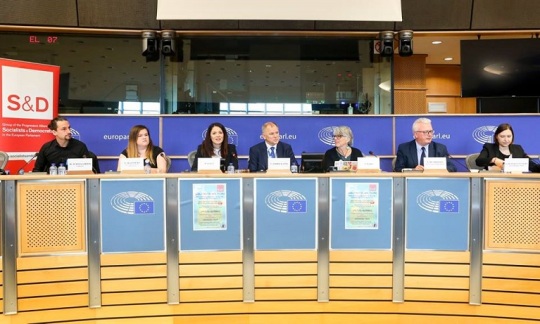Tagged: mentalhealth
The digital age as an opportunity to improve youth mental health

On the 10th of October, celebrating the World Mental Health Day, Mental Health Europe held a conference on the issue of mental health in the digital age. Experts from the industry and representatives from civil society including Youth Mental Health Ambassador Nikki Mattocks, gathered to share expertise and experience on how to prevent, protect and improve youth mental health online.
COFACE-Families Europe was represented on the panel by Martin Schmalzried, who presented the #DeleteCyberbullying project and lessons learned.
The #DeleteCyberbullying project ended in 2014 with key deliverables such as an Android app, an awareness-raising video, an online virtual march and the outcomes of a global European conference on the topic of cyberbullying. Besides the expertise gathered on how to best tackle cyberbullying, one very interesting lesson learned was the comments left by users on its awareness raising video, which reflected the many “myths” surrounding cyberbullying in the minds of regular users/individuals, showing that we are still a long way from ensuring that end users understand the phenomenon and are equipped to adequately respond.
Some of the most important “myths” surrounding cyberbullying include:
- The belief that you can simply turn off the technology on which you experience cyberbullying or disconnect/close your online accounts. In that event, not only does the cyberbullying continue, but it is even worse as you have no idea how many hateful messages or humiliating pictures about you are being circulated behind your back. Even a child who is not using technology at all can be a victim of cyberbullying, for example if a bully decides to open a “fake” account using some humiliating photos of that child.
- Over-simplifying the solution to an action like blocking the bully. While blocking is indeed part of the response to cyberbullying, it is by no means an all-encompassing solution. As explained above, cyberbullying can also happen behind a person’s back.
- “Everyone gets cyberbullied, don’t be such a pussy and toughen up”. The idea that cyberbullying or bullying for that matter are simply part of “life” and one has to toughen up. While it is true that the line between “teasing” and “cyberbullying” are subjective, this belief virtually legitimizes any forms of bullying/cyberbullying, especially the most serious, even criminal forms (like sharing sexual material of underage children to humiliate them). A healthy society shouldn’t be built on the predicament that everyone will get bullied, but rather to strengthen social skills, including social and emotional learning, developing empathy, to prevent such actions in the first place. Finally, it is always easy and convenient for the wolf to recommend sheep to “grow some teeth”.
- “Asking the bully to stop will only make things worse”. This may very well be the case, unfortunately, if the bullying/cyberbullying is unbearable and the victim seeks external help/assistance from a higher authority like a teacher or the police, the very first thing they will be asked is whether they “have told the perpetrators that their actions are hurtful and that they should stop”. This step is therefore a precondition for seeking further help rather than an end in itself.

Finally, Martin Schmalzried underlined that as cyberbullying is getting worse, looking at the statistics from the latest LSE study, policy makers need to envisage broader measures than education. The online environment also plays a role in the uptake of cyberbullying. Online service providers treat their users like subjects rather than citizens with no right to agency over the services they are using. Moderation is taken out of users’ hands and managed by an obscure cloud of professional moderators which cannot possibly respond to every cyberbullying situation in a timely fashion, busy as they are taking down the content which might get them in legal trouble (copyrighted material, child abuse/exploitation/pornography…).
COFACE-Families Europe has been calling for community based moderation, where users themselves have a right to act and shape the services they are using. And this might not only help curb cyberbullying, or hate speech, but is a fundamental necessity for cultivating values of democracy, deliberation, participation and compromise as it requires a community to debate and agree on the rules by which they are governed. Successful examples of community based moderation include Wikipedia, which has been built and populated by users themselves. As a final point, it is to be stressed that community based moderation cannot, by any means, equate to counter speech, which is simply “support” messages to a victim without any right to agency/participation in governing their online services.
More information about the event here.
